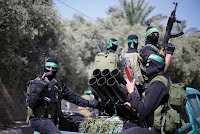Origins and Founding:
Hamas was founded in 1987 during the First Intifada, an uprising by Palestinians against Israeli occupation. Sheikh Ahmed Yassin, a Palestinian cleric, played a significant role in its formation. The organization aimed to resist Israeli occupation and establish an Islamic state in the historical land of Palestine. Its roots were in the Muslim Brotherhood, and its ideology is founded on Islamic fundamentalism and Palestinian nationalism.
Development and Political Ascendancy:
In the early years, Hamas focused on social and charitable activities, gaining support from Palestinians through providing essential services in communities. However, it quickly evolved into a militant organization, conducting attacks against Israeli forces and civilians. Over time, Hamas became a formidable political force, participating in elections and establishing a governing body in the Gaza Strip after winning the 2006 Palestinian legislative elections.
Tactics and Armed Struggle:
Hamas employs a wide range of tactics to achieve its goals. Its military wing, the Izz ad-Din al-Qassam Brigades, carries out armed attacks, including suicide bombings, shootings, and rocket launches into Israel. These attacks have resulted in casualties on both sides and contributed to the perpetuation of the Israeli-Palestinian conflict. Hamas has often used asymmetric warfare tactics, including guerrilla warfare and hiding among civilian populations, leading to criticism and controversy.
Social Services and Grassroots Support:
One of Hamas's significant strengths lies in its extensive network of social services and grassroots support. The organization provides welfare and assistance to Palestinians, such as healthcare, education, and financial support, particularly in the impoverished Gaza Strip. Through these services, Hamas has gained the loyalty and backing of many Palestinians who feel marginalized or neglected by the Palestinian Authority.
Territorial Control in Gaza:
In 2007, following a brief and violent conflict with rival Fatah forces, Hamas seized control of the Gaza Strip, ousting the Palestinian Authority. Since then, Hamas has governed the territory, establishing its rule and security apparatus. The division between Hamas-controlled Gaza and the Fatah-dominated West Bank has further complicated Palestinian politics and the prospects for a unified leadership.
Challenges and International Designation:
Hamas faces challenges in its struggle for legitimacy and recognition on the international stage. It is considered a terrorist organization by several countries, including the United States, the European Union, and Israel, due to its violent tactics and calls for the destruction of Israel. This designation has limited its engagement with the international community and complicated efforts to find a peaceful resolution to the conflict.
Peace Process and Future Prospects:
Hamas's refusal to recognize Israel and its continued armed resistance have complicated peace efforts between Israelis and Palestinians. The organization's dual role as a militant group and political entity has added complexity to diplomatic negotiations. Achieving a lasting peace will require addressing the root causes of the Israeli-Palestinian conflict and finding ways to engage Hamas in a constructive dialogue while ensuring security for both sides.
Conclusion:
Hamas has been a central actor in the Israeli-Palestinian conflict for decades, combining political governance with an armed struggle. Its origins in the First Intifada have shaped its ideology and tactics, making it a highly influential force in Palestinian politics and a challenging adversary for Israel. Understanding Hamas's history and tactics is crucial in navigating the complexities of the Middle East's political landscape and working towards a peaceful and just resolution to the long-standing conflict.








No comments:
Post a Comment